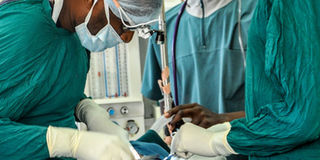High goitre cases worry medics

Intervention. Medical doctors conduct surgery on a goitre patient at Kisoro hospital on Wednesday. PHOTO BY LEONARD MBISHIZIMANA
What you need to know:
- Kisoro hospital also serves Rwandans and Congolese because of its proximity to the two countries.
- Goitre normally manifests in two types. There is toxic goitre and the ordinary goitre.
Kisoro. Medical doctors have expressed concern over the high number of people suffering from goitre in Kigezi Sub-region.
Goitre is a swelling of the thyroid gland that causes a lump in the front of the neck. Although goitres are usually painless, large ones can cause cough and make it difficult for a person to swallow or breathe.
Since Monday, about 25 patients with goitre infection have received free surgery at Kisoro hospital in a medical camp held by a team of surgeons from Kabale Regional Referral Hospital. The camp ends today.
The team leader, Dr Robert Mugarura, on Wednesday said the camp was organised to respond to many cases of goitre in the sub-region.
“There are many patients with goitre infections in Kigezi because most food consumed has no iodine,’’ Dr Mugarura said.
Dr Mugarura added that apart from eating food that has no iodine, goitre can sometimes occur when one’s thyroid gland produces too much thyroid hormone.
He said the disease is common in females aged between 40 and 60 years because they possess glands that use most iodised salts than men.
He added that 74 per cent of adults do not consume enough iodine, warning that the infection can lead to cancer of the throat if not treated.
Dr Mugarura said plans are underway to organise another camp in the area to operate on dozens of patients that were turned away because of lack of logistics.
“A surgery health camp is expensive because it requires a team of experts and the assorted items to be used. When we get funding, we shall in the near future hold another health camp,” he said.
“Our survey indicates that cases of goitre are common in Kisoro because being a hilly area, rains wash away the iodine nutrients that would be consumed by the crops and the latter, after being harvested, the final users do not get iodine from the foods they eat, ” Dr Mugarura added.
Kisoro hospital administrator Benjamin Akankwasa said the camp was organised to help the patients that lack money for treatment in private health facilities.
The surgery and treatment of goitre costs between Shs1.5 million and Shs3 million.
“We last held the surgical medical camp at Kisoro hospital in 2016 where we received specialists from AMREF Africa but more patients were visiting the hospital seeking for the service and we don’t have any specialist to carry out operations,’’ Mr Akankwasa said.
Kisoro hospital also serves Rwandans and Congolese because of its proximity to the two countries.
Goitre normally manifests in two types. There is toxic goitre and the ordinary goitre.
Toxic goitre is more dangerous because it leads to the making of excessive hormones which can bring about severe disfigurement of one’s thyroid gland.




